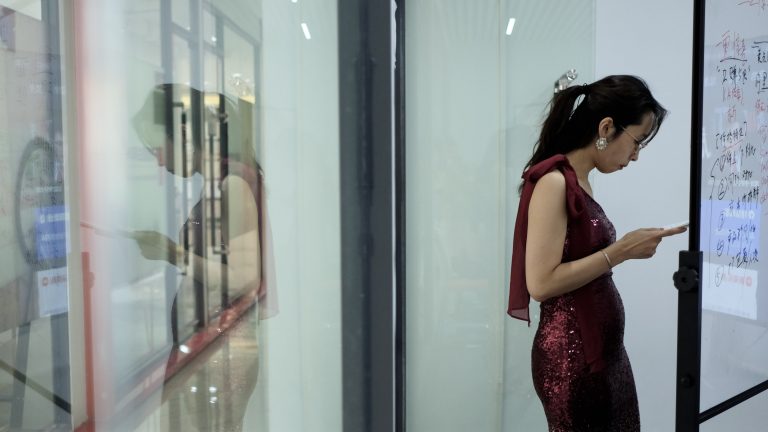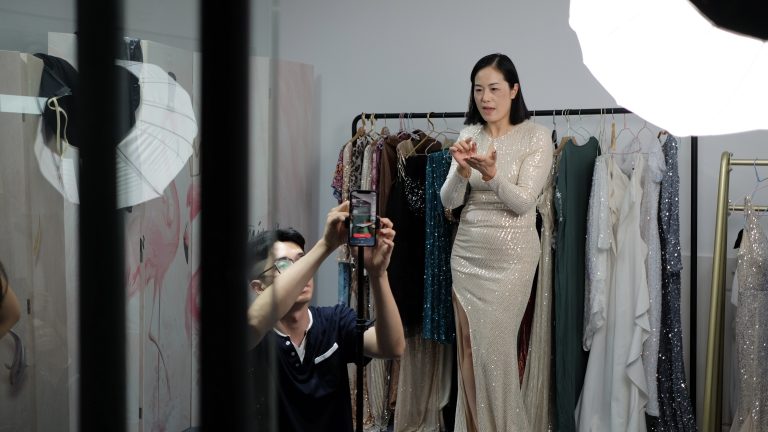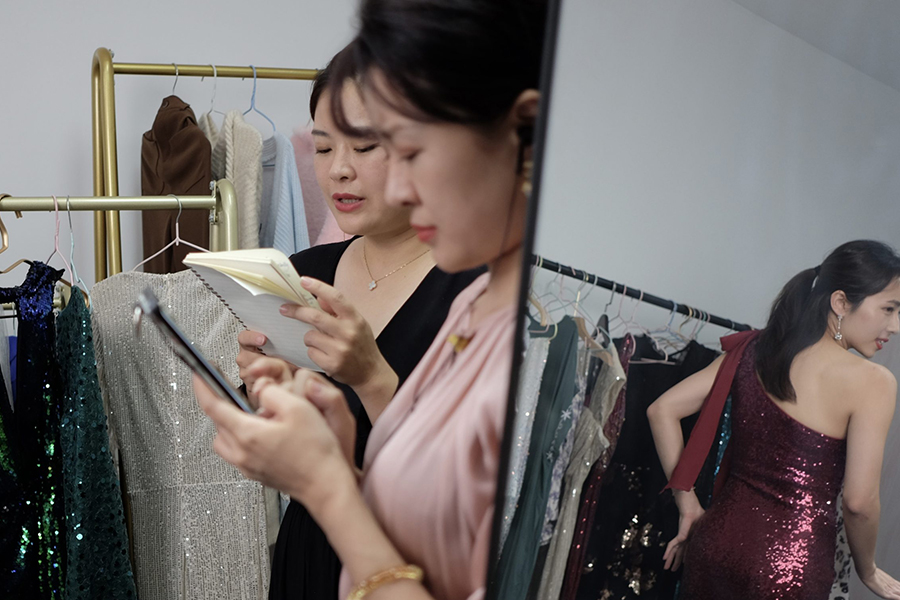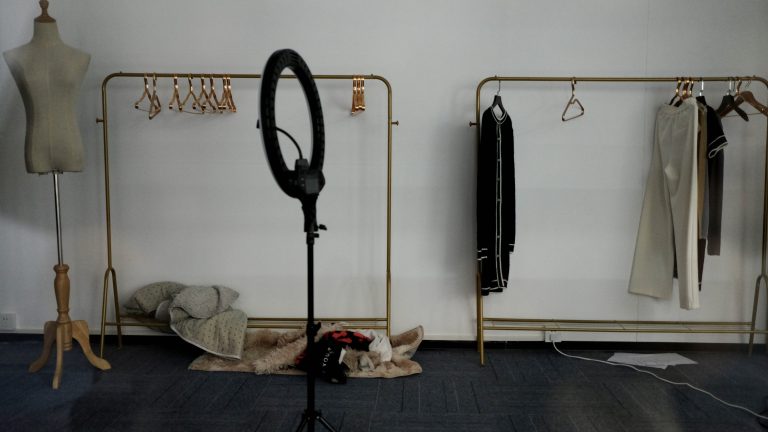Inside a boot camp for Chinese TikTok sellers bringing live e-commerce to the U.S.
Jacqueline Zhuang made her debut as a TikTok live-shopping host from a studio in Guangzhou, promoting the sequined red dress she was wearing, in front of a rack of glittery clothes. “If you wear it to your bestie’s wedding, I’m sure the men stare at you, and the girls envy you,” Zhuang declared passionately in English. Encouraging voices cheered her on from off camera. “For the friends who pick it, I will have an extra surprise for you,” she added.
Only a week earlier, 30-year-old Zhuang had quit her decade-long career as a newspaper journalist and television anchor for what she believes is a career of the future — hosting live streams on TikTok to sell things to shoppers in the West. To set herself up for success, Zhuang joined a boot camp, a two-day crash course in sales tactics and English-language internet slang to entice Western shoppers. Promoters of the course promised to show Zhuang and the other attendees — factory owners, teachers and a former flight attendant — everything they needed to know to sell Chinese products to English-speaking consumers on the world’s most popular social media platform.
In just a few years, buying products at a discount during a livestream has become one of the most popular ways to shop in China. On platforms like Taobao Live and TikTok’s sister app Douyin, livestream hosts sell everything, from drain cleaner to lipstick, with the chatty intimacy of the home shopping network, drawing millions of viewers to their fleeting discounts.
As livestreaming has ballooned into a $400 billion industry in China, its success has convinced Chinese entrepreneurs — and TikTok itself — that it’s only a matter of time before the rest of the world begins to shop this way. Chinese suppliers, livestreamers, and talent agents have become the earliest proponents of TikTok live shopping for Western audiences, hoping sales tactics honed on Douyin and affordable goods will help them get consumers around the world hooked on China’s favorite way to shop online.
“There’s no offline store that can sell millions of a single product through a single storefront in one day,” Bian Shiqi, who attended the boot camp in Guangzhou, told Rest of World. After working in international trade for a few years, the 35-year-old investor said she became convinced that TikTok could be the future of cross border e-commerce while watching a prolific seller on Douyin.
Despite its global popularity, TikTok has yet to transform into a shopping destination. TikTok has tested a function called TikTok Shop — where shoppers can buy directly in the app — in Indonesia, Thailand, Malaysia, and the U.K., but in most other places, shoppers have to undertake an additional step and navigate to the streamer’s website to actually purchase something they saw on TikTok. Although shoppers aren’t tuning into TikTok livestreams by the millions the way they are on Douyin, livestreamers and talent agents believe live shopping can become as popular as TikTok itself.

“In the U.S., it’s going to work first,” Cecilia Velazquez Traut, who works with influencers in Latin America, told Rest of World. “Because people [there] consume a lot, they buy and buy — they just need someone to advise about buying.”
The boot camp Zhuang and Bian, along with six other students, had signed up for was led by Yan Guanghua, a former English teacher from Chongqing. The eight attendees were gathered inside a conference room within a building in a sprawling industrial zone on the outskirts of Guangzhou. Yan, who says she makes up to $11,000 from a single livestream session (crystals are a hit with shoppers in the West) promises to share her secrets with attendees during a 20-hour workshop packed into two days. She charges students $970 for the class, walking them through the finer points of cultivating a TikTok account that could sell millions of dollars in clothes, cosmetics, jewelry, or other products to viewers from Los Angeles to London.
Yan wanted to follow in the footsteps of China’s top e-commerce influencers — “livestreaming queen” Viya and “lipstick king” Austin Li — but felt Douyin’s saturated market was too competitive. To capitalize on her English-speaking skills, she tried TikTok instead, initially hawking yoga clothes, headphone cases, and lighters for an export company in Shenzhen. These days she goes live for three to four hours a day, selling handbags and beauty products to shoppers mainly in the U.S. When Rest of World visited her boot camp in September, she was planning an elaborate Halloween-themed backdrop to catch Western viewers’ attention as they scrolled through TikTok.
Analysts have predicted for years that Chinese-style e-commerce would take the West by storm, only for efforts by Pinduoduo and Alibaba to fall flat. But Yan believes that she and other livestream hosts have a chance to make it stick on TikTok, thanks to their grasp of the sales tactics that got Chinese shoppers hooked on Douyin and powered hundreds of billions of dollars of livestream sales in China. “The customer needs to feel a sense of resonance,” said Yan. She said hosts must cultivate an “infectious personality” by “keeping up a rapid rhythm of an item’s selling points.”
Yan developed her playbook by studying China’s star livestreamers and learned how they created imaginative scenarios to entice consumers. “‘This coat is so warm, it’s like your boyfriend is hugging you’ — I sold so many coats with this line,” Yan told Rest of World. “Some people commented they didn’t have boyfriends, but I said, it’s better to have no boyfriend — just wear the coat and experience the feeling of having a boyfriend.”

According to Yan, it doesn’t matter how good a host’s English is or how pretty they are — what matters is mastering consumer psychology. “It’s not about emphasizing what’s good about the product but why you need it, in which scenarios you need it, and what kind of compliments you will receive after you buy it,” said Yan.
For Bian, the thing that makes livestream e-commerce different from shopping on a platform like Taobao or Amazon is that it’s also entertainment. “Taobao is ‘search e-commerce,’ where you search for what you need to buy,” she said. “But Douyin is ‘interest e-commerce,’ where, while you’re having fun, you discover this thing that you need.”
Despite her dedication, what Yan makes from TikTok pales in comparison to what Chinese hosts earn on Douyin. With 600 million daily active users, goods worth more than $3 billion were reportedly sold on Douyin in the first half of 2022. On TikTok, with more than 1 billion monthly active users, more than $1 billion of products were sold in the first half of 2022, according to Chinese publication Late Post. A large chunk of the sales came from Indonesia, where, in 2021, TikTok rolled out its earliest pilot of TikTok Shop. The company is planning to roll out livestream shopping in North America ahead of the holiday season, under a partnership with TalkShopLive. It also plans to introduce TikTok Shop in Brazil next year.
At the livestream sales boot camp, for the final session, each trainee had to write a script for the party dress they were asked to wear. At about 8:30 p.m., they took turns appearing in one of Yan’s live accounts, promoting the dresses to an imaginary audience.

Zhuang made a pitch for the red sequin dress and offered a pair of earrings as gifts — giving freebies is one strategy Yan taught in her class. “Five, four, three, two, one,” she practiced counting down in English, just like livestreamers in China do to encourage millions to place their orders at the same time. In the future, Zhuang said, she plans to use the skills she learned to sell the agarwood incense produced by her family’s factory.
All of her attendees are banking on TikTok for their success, Yan said, and these Chinese pioneers would hopefully make TikTok profitable enough for foreign businesses to join in a few years. “If the platform succeeds, we will succeed over the next two or three years,” she said. “If it doesn’t take off in two or three years, we will have nothing left.”
Source: Rest of World






